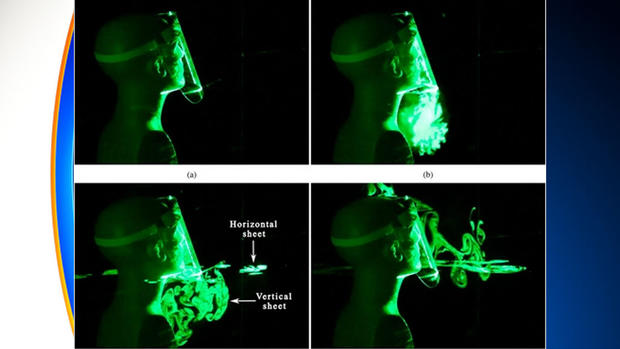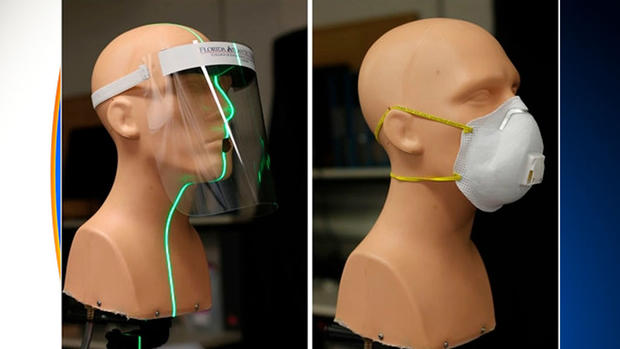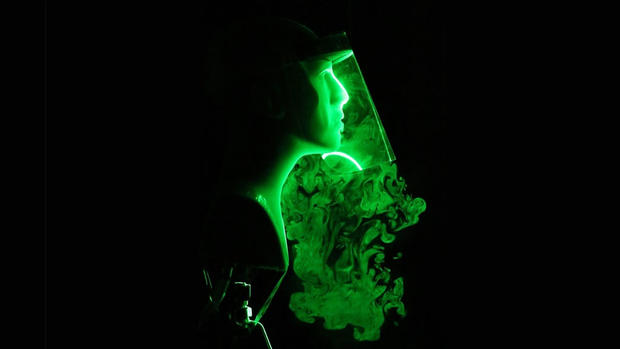Florida Study Finds Face Shields, Masks With Valves Can't Stop COVID-19 Spread
MIAMI (CBSMiami) -- A new simulation shows the limitations of face shields to protect against the coronavirus. Researchers at Florida Atlantic University in Boca Raton used laser light to show how face shields are able to block the initial forward motion of a simulated cough but fine droplets are easily able to move around the visor.
The FAU researchers conducted the study to increase public awareness about the effectiveness of face shields alone as well as face masks with exhalation valves.
"From this latest study, we were able to observe that face shields are able to block the initial forward motion of the exhaled jet, however, aerosolized droplets expelled with the jet are able to move around the visor with relative ease," said Manhar Dhanak, department chair, professor and director of SeaTech at FAU. "Over time, these droplets can disperse over a wide area in both lateral and longitudinal directions, albeit with decreasing droplet concentration."
The study, published in the journal of Physics of Fluids, used a laser light sheet and a mixture of distilled water and glycerin to generate the synthetic fog that made up the cough-jet. A mannequin was used to simulate a cough and sneezing. Using both a plastic face shield and an N95-rated face mask with a valve they were able to map out the path of the droplets.
The study shows face shields block the initial forward motion of the aerosolized droplets but are able to move around the visor with ease and spread out over a large area depending on light ambient disturbances. The face mask with valve showed a large number of droplets passing through the exhale valve unfiltered which significantly reduces its effectiveness as a means of source control.
Like the N95-rated face mask used in this study, other types of masks such as certain cloth-based masks also come equipped with one to two exhale ports, The N95-rated face mask with the exhale valve used in this study had a small amount of exhaled droplets that escaped from the gap between the top of the mask and the bridge of the nose. Moreover, the exhalation port significantly reduced the effectiveness of the mask as a means of source control, as a large number of droplets passed through the valve unfiltered and unhindered.
"There is an increasing trend of people substituting regular cloth or surgical masks with clear plastic face shields as well as using masks that are equipped with exhalation valves," said Siddhartha Verma, lead author and assistant professor. "A driving factor for this increased adoption is better comfort compared to regular masks. However, face shields have noticeable gaps along the bottom and the sides, and masks with exhalation ports include a one-way valve which restricts airflow when breathing in, but allows free outflow of air. The inhaled air gets filtered through the mask material, but the exhaled breath passes through the valve unfiltered."
The researchers say that the key takeaway from this latest study illustrates that face shields and masks with exhale valves may not be as effective as regular face masks in restricting the spread of aerosolized droplets.
Despite the increased comfort that these alternatives offer, they say it may be preferable to use well-constructed, high quality cloth or surgical masks that are of a plain design, instead of face shields and masks equipped with exhale valves.
Widespread public adoption of the alternatives, in lieu of regular masks, could potentially have an adverse effect on ongoing mitigation efforts against COVID-19.
"The research conducted by professors Dhanak and Verma on the importance of proper face coverings to stop the spread of COVID-19 has literally illuminated the world," said Stella Batalama, Ph.D., dean of FAU's College of Engineering and Computer Science. "While broad acceptance regarding the need for face coverings has risen steadily, there is an increasing trend of people who are substituting regular cloth or surgical masks with clear plastic face shields, and with masks equipped with exhalation valves. This latest research provides important evidence to further support CDC guidelines and inform the public to make better selections in their choice for face coverings for their benefit and for public safety."






